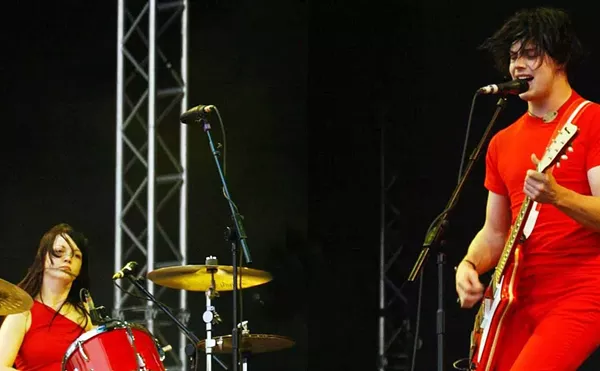
Audio By Carbonatix
[
{
"name": "GPT - Leaderboard - Inline - Content",
"component": "35519556",
"insertPoint": "5th",
"startingPoint": "3",
"requiredCountToDisplay": "3",
"maxInsertions": 100,
"adList": [
{
"adPreset": "LeaderboardInline"
}
]
}
]
"It is what it is. You are who you are. So get outta da middla da sidewalk, you meathead muthafucka, I got places ta be!"
These are the second people. They recognize the wonder of the city — they once were the first people — but they also know it’d be a helluva lot better place without the festering rot of the stale cocheese, the relentless inertia caused by the clueless, and the nonstop narcissistic navel-gazing. Which also makes it a lot like the music biz.
CMJ’s Music Marathon in New York is the logical conclusion of a good idea gone wrong, an event that marries an innocent faith in good music with the predatory calculation inherent in the survival of the fittest, the revolutionary idea of a college radio magazine alternative to Billboard with what happens to most revolutions. Started more than 20 years ago, College Music Journal, host of the annual four-day festival, tapped into a community of student-run radio stations, providing a clearinghouse of information on small indie bands — when such info was hard to come by — and a chart against which to measure this niche popularity. But after years of offering "batting averages" for the major labels’ farm system, radio and the major labels have largely moved on, leaving CMJ and its recently deceased competition, Gavin, holding the Limburger. Sure, there’s still the occasional Ryan Adams (who played a mega-sold-out show in tiny Brownie’s in 2000), but the labels are now more interested in building their bands from the ground up than investing much time, interest or money in established indie acts capable of crossing over, such as REM or Beck (both past CMJ participants). As a result, the festival’s increasingly become a dispiriting spectacle of earnest, hopeful bands chasing a receding opportunity, like day laborers crowding the Monday morning job van. Like Dustin Hoffman in Tootsie, they seem to be subconsciously muttering, "I can play taller."
True to form, opening night of CMJ is beset by the kind of organizational chaos generally associated with a banana republic or the Bureau of Indian Affairs. The open bar, er, opening night party turns away a steady stream of RSVP’d invitees who had disappeared from the guest list. This, after the opening night showcase had to be moved to the Bowery because the Roxy (whose legendary hospitality rivals ebola) had double-booked its house. At the Fez, Joan Rivers’ tired shtick pre-empted the Misra Records showcase, because apparently there are still people who will pay to hear her complain about how she can’t get laid. (Nice work if you can get it.) All over town there was hardly a show that went off on time, and the Fags were no exception.
Playing at little Tobacco Road, in the shadow of the Port Authority Bus Terminal, the sparsely attended show had the feel of a backyard cook-out where everyone there is a friend of the host. Garbed in black pants, white shirts and skinny black ties, it wasn’t immediately apparent whether they were channeling the spirit of ’80s one-hit wonders The Knack or auditioning for the musical revival of TV’s "Square Pegs." Sartorial uniformity seems a pretty ironic choice for someone working a power-pop sound.
That said, The Fags have a nice melodic touch, and singer John Speck invokes The Faces’ Rod Stewart, before his voice deteriorated into a tracheal growl. They’re pretty loud and raucous, which gets in the way of the songs, but knowing CMJ, it was probably just a shitty mix. Give them the benefit of the doubt on the strength of some decent lyrics. Of course, others were more impressed. An elderly suit — looking suspiciously like IRS founder Miles Copeland — congratulated drummer Jimmy Paluzzi after the show and told him it was great. A sweet old man, Copeland made CMJ a few years ago when he earnestly compared file-trading to the final solution on a panel with former Universal and Warners weasel Danny Goldberg.
The next night, Halloween, is different in Manhattan, sort of like Devil’s Night. But instead of a self-immolating spirit birthed of drugs and desperate poverty, it’s resplendent with a self-indulgent creativity that speaks as much of the Manhattan-ite excesses of time and money as the desperate desire to stand out in a city of 8 million. The huge, freak-flag-waving parade of costumes and social deviancy (with accompanying voyeurs) tied up a major east-side thoroughfare for several hours, making north/south travel a nightmare. A purgatorial cab trip from MC Paul Barman’s smart, funny uptown rap performance lasted longer than some marriages and was followed by a shutout of the Von Bondies/Dirtbombs show at the Bowery. One explanation is the salivating industry weasels sniffing at said bands’ heels. The other equally likely reason is the free-beer giveaway sponsored by Rheingold. (Unfortunately, no matter how much sugar and carbonation they pump into that bilge-water swill, it can’t disguise its unholy heritage as the bastard offspring of Milwaukee’s Beast and head-throb-in-a-can PBR.)
After the All Hollow’s nightmare, Friday night was bracketed by a pair of terrific performances. The evening’s start was presided over by Brendan Benson, opening the Irving Plaza show headlined by Idlewild. Benson’s effortless pop comes across as far more sophisticated than the Fags. Of course, Benson has had plenty of time to hone his chops. He spent six years extricating himself from his Virgin contract, and only released his second album, Lapalco, early this year (a cautionary note to those knee-jerkedly following the major-label rainbow to that pot of pyrite). His all-too-brief 40-minute set was enough time for Benson to sink his hooks in with an amalgamation that recalls both Possum Dixon’s nervy power pop and Matthew Sweet’s ringing guitar melodicism. Freshly returned from an overseas tour and using borrowed amps and mikes, Benson and his Wellfed Boys were nonetheless sharp, and the surprisingly large, supportive crowd signaled its approval as they laid into little gems such as "Sittin’ Pretty," "You’re Quiet" and "Tiny Spark." Later that night, Maxwell’s in Hoboken hosted a show with Detroit’s Electric Six and The Dirtbombs. It proved not to be, when Thee Shams and Electric Six switched time slots, but the Dirtbombs leavened any disappointment. Led by the rollicking, sunglassed glory of the former Gories frontman, Mick Collins, the Dirtbombs are a nuclear party machine capable of leveling audiences with their rock/soul fusion. The double-drum, double-bass attack seemingly ensures powerful low-end torque, but it’s really Collins’ high-revving guitar and sweet Curtis Mayfield-spawned vocals that gives them their style. Veering from ravenous garage rave-ups to high-throttle soul, Collins laid into J.J. Barnes’ "Chains of Love," Stevie Wonder’s "Livin’ for the City" and Marvin Gaye’s "Got To Give It Up," delivering all with a thunderous roar.
For its encore, the band invited several female DJs from WFMU on stage to dance with the band. Headlights blaring, the wife-beater and T-shirt clad hotties shook it while Collins cooked it, and we partook of a room-rattling groove.
If it were only about the bands and the music, CMJ’s marathon might be all it imagines itself to be. But its illusory self-image is marred by the same mercantile considerations and selfish self-absorption that permeate the business. Negotiating the loud, crowded showcases buffeted by smoozing publicists, labels, musicians and writers suckling at the industry’s hairy, bulbous tit, one longs for the days when the music was pure, if underrecognized, and those who went, went for a show, not to see and be seen. Yet, enjoying Bright Eyes’ set, one hears someone loudly sshh-ing the murmuring crowd between songs, lest, I suppose, they miss Conor utter something like, "Could you hand me that?" Such precocious obsessiveness illustrates the other side of the coin, and the reason one avoids Low and its legions of OCD fans.
Remarking to the pretentious sshh-ing freak, "Yes, we wouldn’t want to miss any of Conor’s silence," it comes clear that this horrific, overcompromised mess that is CMJ, is nothing more than a parable for the tyranny of taste, and that maybe the music was better when nobody cared. Of course, the way the "industry" is going these days, it may be only a furlong behind the Democrats in returning to those days again. Be comforted that this will never mean there isn’t good music out there, just that you maybe won’t have to share it with clueless trend-chasers. Chris Parker is a freelance writer. E-mail him at letters@metrotimes.com





